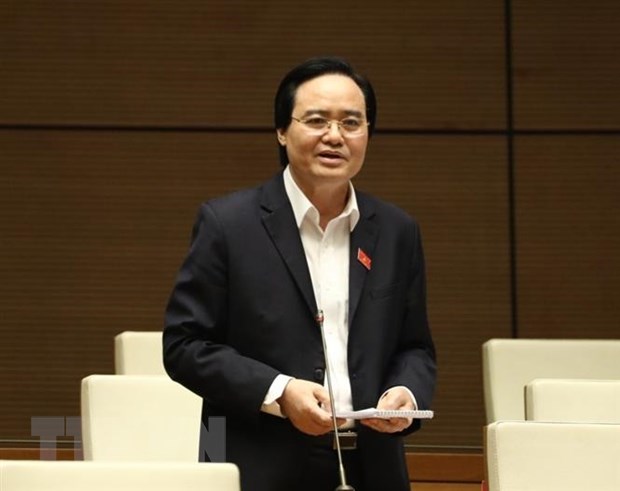 Society
Society


|
| Education and training minister Phùng Xuân Nhạ. VNA/VNS Photo |
HÀ NỘI - Education minister Phùng Xuân Nhạ has said his priority this year is giving authority to university councils to hasten universities’ transition to greater autonomy.
“I’ll pay great attention to making sure the university councils do not exist in name only. It’s a real challenge though, to make those institutions hold power both de jure and de facto,” Nhạ said in a recent interview with the Vietnam News Agency on his plans for the new year.
The concept of university councils is not new in Việt Nam as many universities and colleges have had councils for years, though their power has been limited.
The Ministry of Education's new Law on Amending and Supplementing Articles of the Law on Higher Education, also known as Code 34, passed the National Assembly in 2018, aiming to grant the university councils de facto authority.
According to the law, university councils are responsible for a wide range of tasks, including making long-term development strategies for the universities, supervising general operations and deciding the office terms of principals.
“The prevailing lack of real authoritative power of the university councils is a barrier to university autonomy,” Nhạ said.
The minister also revealed his first moves to evaluate the higher education system in preparation for a thorough restructuring in the coming years.
According to Nhạ, the Ministry of Education and Training has submitted two proposals to the Government, with one a proposal to integrate, merge or close public universities and another on restructuring and reorganising pedagogy higher education facilities.
“Universities which offer similar degrees or subpar universities have to consider mergers or dissolution,” he said. “In general, the higher education system has to be organised in an appropriate manner to catch up with the demands of economic development.”
“Restructuring will solve both short- and long-term puzzles so that we can have a sound higher education system with big and well-known universities 10 years later.”
Challenges
The minister admitted the biggest challenge to the country’s education system was the subpar capabilities of not only educational officers but also teachers to embrace changes.
2020 is the first year a totally new teaching approach and method are introduced to general education. The ministry was struggling to offer training to millions of teachers in preparation for the next school year while also trying to find sufficient teachers to work in remote areas, according to Nhạ.
“Another challenge is that the teachers’ heavy responsibilities don’t match with their remuneration,” he added.
Infrastructure shortage was another prolonged problem in both remote schools and those in big cities, the minister said.
Several classrooms in populated cities like Hà Nội and HCM City were crammed with students of which the number often exceeded allowed limits. Rapid urbanisation leading to high population growth was the main reason for school overloads, he said. VNS




